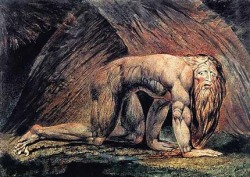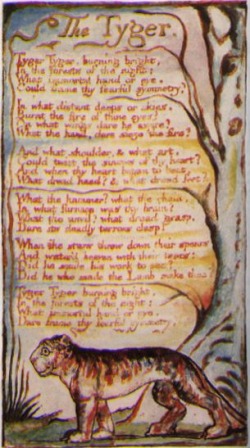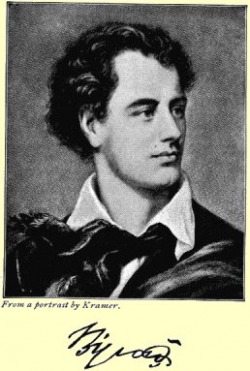The Romantics

William Blake was born in 1757 and grew up in England. He had no formal education until the age of 10. He was an apprentice to an engraver and is known for his series of copper plate engravings (see image above). He was inducted into the English Gothic traditon by drawing the monuments in Westminster Abbey, where he observed monks, priests, etc. He first sought a career as a painter but abandoned his formal training. He was married in 1782 and set up shop as an engraver. He began experimenting with verse forms in the late 1780's and incorporating them into his printing. "The Book of Thel", 1789, was distinctive of what would be Blake's "infernal" method... he would draw his design and text in revers onto a copper plate and varnis it. His images are an integral part of his poetry. "Thel" contains a number of Blake's preoccupations that recur in his work: a parallel world, a fall from grace, and sexual initiation.
"Songs of Innocence and Experience" were intended for children and as a dialogue with one another (innocence + experience). Blake believed that innocence was not sufficient and that humans must make the journey toward experience. While innocence was a relfection of the period of optimism, the French Revolution, Experience was contemporaneous with the Reign of Terror. Blake detested the "systmematizing tendancies of religious beliefs"; he was a strong believer in "free will". "The Marriage of Heaven and Hell" reflects his vision of opposites as part of cosmic unity-- "opposition is true friendship". He was a contemporary of Mary Wolsternercraft and saw the plight of women and slaves as a failure of society to comprehend fully what the eye sees. Blake struggles with the quesiton, "Why did God permit the Fall", which he tries to determine in his work "The Book of Urizen". To Blake, creation is fragmentation of a primal unity, the God who rules over which must be a cruel demon. Time, formalized relgion, and the human body are seen in the poem as different kinds of restrictions put upon mankind in the aftermath of the fall. His works are deemed "visionary". While Blake was somewhat of a precursor to the Romantics, his visionary aspects of his work make him the first Romantic poet, as he inspired those to come.
"The Lamb" and "The Tyger" contain simple words and sentences; the narrator addresses the lamb directly, asking childlike questions and answers them like a child pretending to be a teacher. The potential sacrifice of innocence is there, though, and is realized in "The Tyger". The voice here is adult, and the lanugage and sentences are more complex. The setting and word choice evokes different feelings, such as?? Were they made by different beings? This is a difficult idea to reconcile.
LORD BYRON:
He was the "seductively attractive" and best-selling poet of his day! He was "hit on" by a nurse when he was only 11 years old, fell in love with several of his cousins, abandoned a friendship b/c of sexual advances being made towards him, lived lavishily with plenty of money and mistresses, etc... he had a unique quality of being "universally attractive". He once bragged that he "had sex with 250 women in Venice over the course of a single year". He was all-inclusive-- boys, siblings (rumors that he had an affair with one of his half sisters), women of all classes... He went to live abroad to escape the criticism of British society where "men could be forgiven for sexual misconduct, but only up to a point" (which Bryon far surpassed)! He had an unhappy marriage and a daughter, Augusta (he wanted a son). They eventually separated. He later had another child via an affair.
He had a magnetic personality and a reputation of being unconventional, eccentric, flamboyant, and controversial. He had extreme mood swings (possibly bipolar). He also had a great fondness for animals and had a famous dog named Boatswain; when he contracted rabies, Byron nursed him... he was buried at Newstead Abbey and has a monument larger than Byron's; the inscription on the monument is Byron's "Epitaph to a Dog": Near this spot / Are deposited the Remains/ of one / Who possessed Beauty/ Without Vanity,/ Strenght without Insolence, / Courage without Ferocity, / And all the Virtues of a Man/ Without his Vices.... etc. Bryon also kept a bear while he was a student at Trinity College (b/c the college had rules for forbidding pet dogs); he even suggested that the bear apply for a fellowship. At other times, he kept a fox, monekeys, parrot, badger, etc...
The famous meeting of minds: Byron and 5 friends were kept inside the Villa Diodati by the "incessant rain" of that "wet, ungenial summer", and for over 3 days in June, the 5 turned to reading fantastical stories and devising their own tales. Regular conversations at the Villa Diodati in 1816 led to inspiration for Mary Shelley's novel "Frankenstein" and for Bryon's greats works, "Manfred", "Prometheus", and "Child Harold", as well as some of P.B. Shelley's greatest poems. He began his masterpiece "Don Juan" in 1819; it was said that this work would do more harm to the English character than anything of the time; its popularity is in its absence of respect for all things sacred and respectable, and for its humor. He was said to be "in love" with one of his married lovers until his death in 1824.
"She Walks in Beauty" is considered the great metaphor in poetry... is the speaker's admiration detached and pure??
COLERIDGE: Was born in 1772 and was well0educated in Latin and Greek. He espoused Republicanism and had distinctive philosophical and religious notions: Humanity cannot resist the force of redemption, and that the love of nature contains morally-improving powers. He was paid $150 a year for life to devote himself to poetry and philosophy. He had an important friendship with another Romantic poet, Wordsworth, and the two men inspired each other. His most important poems are "The Rhyme of the Ancient Mariner", "Cristabel", and "Kubla Khan". He was addicted to opium and became seen as a person whose "promise outweighed his achievements" until the 20th century with the complete publication of his notebooks, letters, and collected works. He is now seen as one of the truly great Romantic poets.
"Kubla Khan": Was written under the influence of opium. He awakened from a "dream vision" with someone knocking at the door. The 1st stanza is incantatory and describes an exotic, mysterious land of measureless caverns and sunless sea. The 2nd continues the description of the "holy and enchanted place" where the "mighty fountain" and "sacred river" begin. There is a shadow of a pleasure dome that floats on waves and disappears. A vision of a damsel appears singing a haunting melody-- the speaker can't remember it, and this frustrates him. While he can't recreate the song or pleasure dome, he creates the poem, thus becoming a master poet.


